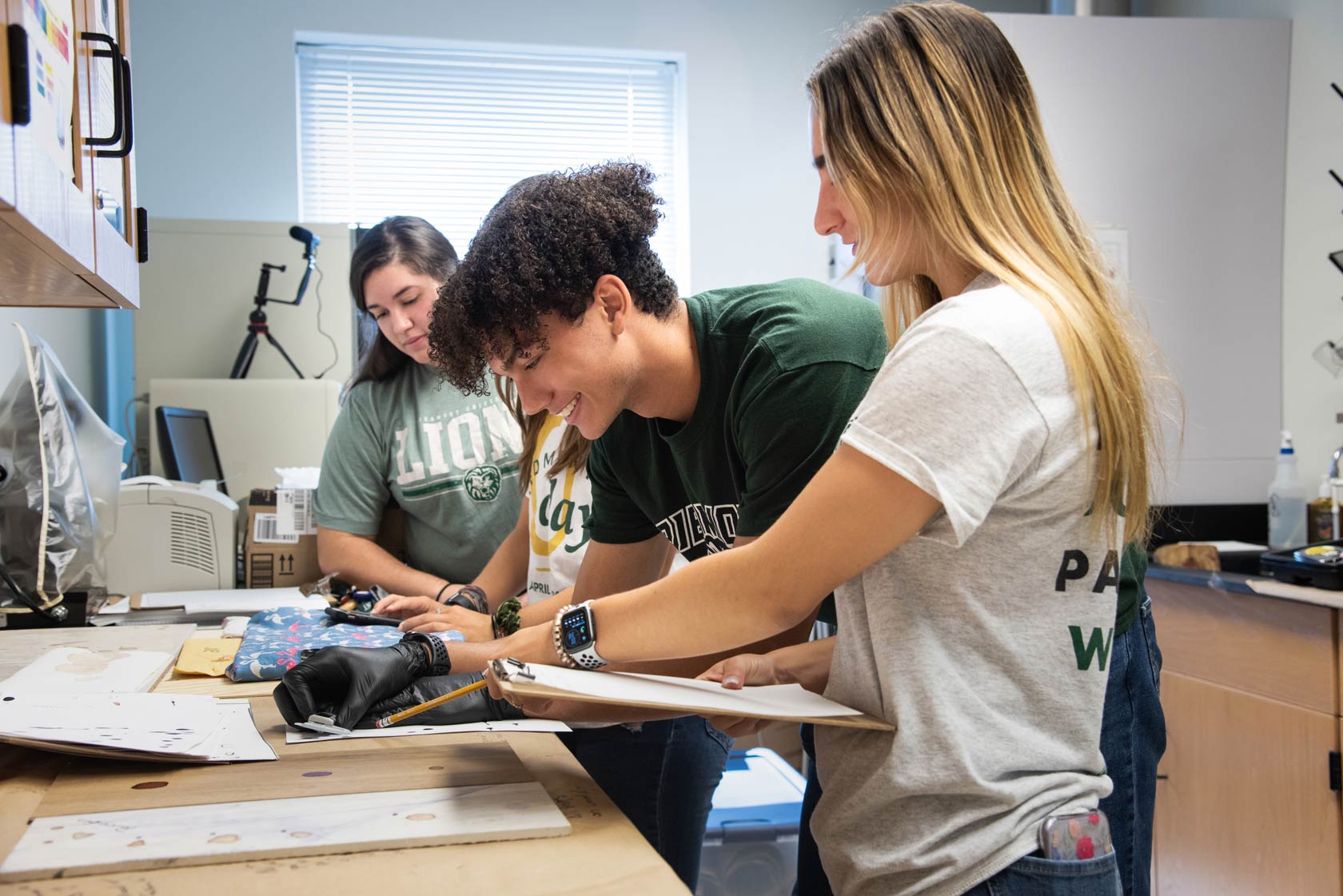Interested in Forensic Science?
Our undergraduate admissions team will contact you with more information.
QUESTIONS?
Our Undergraduate Admissions team can help!
Undergraduate Admissions
P: 706-776-0103
E: ugrad@piedmont.edu
ACCT 2010. Accounting I
BIOL 2100. Human Anatomy and Physiology I
BIOL 2110. Human Anatomy and Physiology II
CHEM 1101. General Chemistry I
CLAB 1101. General Chemistry I Lab
CHEM 1102. General Chemistry II
CLAB 1102. General Chemistry II Lab
CHEM 2351. Organic Chemistry I
CRJU 1290. Introduction to Criminal Justice
CRJU 3335. Criminal Investigation
CRJU 3370. Adjudication Processes
ENGL 3335. Technical Writing
FRSC 1101. Introduction to Forensic Science
FRSC 2100. Essential Practices of Forensic Science
FRSC 3100. Crime Scene Investigation I
FRSC 3200. Latent Fingerprints
FRSC 4100. Crime Scene Investigation II
FRSC 4750. Internship in Forensic Science
FRSC 4900. Forensic Science Senior Research and Seminar
GRDS 2260 Digital Photography
MATH 2100. Elementary Statistics
PHYS 2110. General Physics I
PHYS 2120. General Physics II
SOSC 3310. Research Methods
Solve Criminal Cases.
Have you ever wanted to help solve a cold case? Or become a crime scene investigator to determine who was involved in a crime and what actually occurred? Forensic science is comprised of a variety of disciplines and involves documenting, mapping, photographing, and tracing evidence using DNA, serology, bloodstain pattern analysis, ballistics, toxicology, and more, to help solve crimes and make legal cases.
Ranked #26 Forensic Science Program in the United States
by study.com
In this growing field, forensic science professionals have a multitude of job opportunities, ranging from crime scene investigation to forensic investigation, pathology, toxicology, and arson investigation.
Piedmont University is the perfect institution to pursue your undergraduate degree in forensic science.
Students pursuing a degree in forensic science receive extensive practical preparation designed to ready them for their future careers. The professional connections and experience in forensics offered by Piedmont faculty is unmatched in Georgia. Student learning extends beyond the laboratory, and specialty courses such as crime scene photography, evidence documentation, and courtroom procedure provide knowledge and experiences not typically offered in forensic science programs. Students also participate in professional experiences through a required, semester-long internship typically with a local or regional law enforcement agency. These relationships and proficiencies give students the practical knowledge and professional contacts they need to launch a successful career. Through these experiences, Piedmont students have actually solved cold cases and have been part of investigations in our regional community.
Within the program, students have two tracks to choose from: lab services for incoming laboratory scientists, and a second track that focuses on mastery of forensic disciplines. In the first track option, students take courses in forensic sciences, as well as chemistry, biology, and mathematics — all of which provide knowledge employers desire in their incoming forensic scientists. The second track is focused on mastery of the forensic disciplines, including documentation, mapping, photography, fingerprints or other imprint evidence, DNA, ballistics, bloodstain patterns, and more.
Piedmont Helps Launch Your Career in Forensic Science
Another advantage of becoming a Piedmont student is that prior to graduation, Piedmont faculty and staff work to place all graduating forensic science students in an employed position — allowing for a smooth transition from student to practitioner. Some students may also move on to pursue graduate degrees, and many have been accepted into some of the best graduate programs in the country. Currently, Piedmont University has a 100% placement rate in either an employed position or graduate program dependent on the graduate's career plan.
According to the U.S. Bureau of Labor Statistics, employment of forensic science technicians is projected to grow by14 percent from 2019 to 2029, much faster than the average for all occupations. State and local governments are expected to hire additional forensic science technicians to process their high caseloads. Additionally, scientific and technological advances are expected to increase the availability, reliability, and usefulness of objective forensic information used as evidence in trials. As a result, forensic science technicians will be able to provide even greater value than before, and more forensic science technicians will be needed to provide timely forensics information to law enforcement agencies and courts.
Reach Your Peak Potential
Piedmont graduates in Forensic Science have pursued careers in:
- Behavioral Science
- Computer Analysis
- Crime Laboratory Analysis
- Crime Scene Examination
- Criminology
- Document Examination
- Forensic Engineering
- Medical Examination
Recent News
John Lanneau has law enforcement written all over him, and rightly so. He…
Keep Reading Lanneau Brings Decades of Real World Experience to Forensics, Criminal Justice ProgramsMore than 200 Piedmont students participated in the college’s annual disaster drill March…
Keep Reading Disaster drill 2021Piedmont University's Forensic Science Program has been rated among the best in the…
Keep Reading Forensic Science program ranked among best in countryWhere do I start?
Related Programs
You might also be interested in one of these programs.
Criminal Justice
Reach Your Peak Potential. What can I do with a major inCRIMINAL JUSTICE?Piedmont graduates in Criminal Justice have pursued careers in: Where do I start?…
Explore this MajorComputer Science
Reach Your Peak Potential. Piedmont graduates in Computer Science pursue careers as: Where do I start?…
Explore this MajorPhilosophy & Religion
Prepare to Make a Life What can I do with a major inPHILOSOPHY & RELIGION?Piedmont students have gone on to pursue careers in: Social Services Fundraising Administration Education Student Affairs Government Public Policy Campaign Management Staff Administration Ethics Medical Writing Editing Humanitarian Services Program Administration Campus Ministry Communications Counseling Crisis Services Clergy Religious Leadership Chaplaincy…
Explore this Major